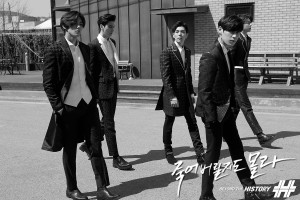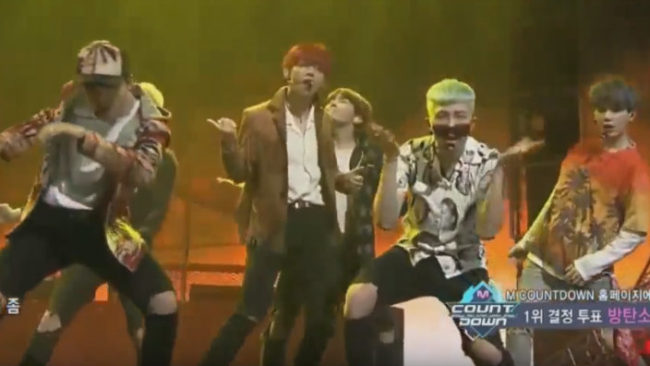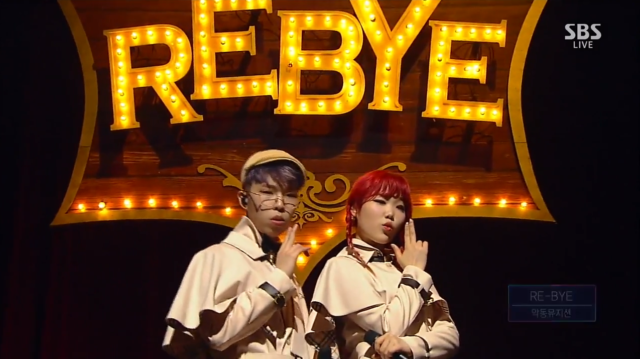 History debuted in 2013 as the first boy group from LOEN Entertainment, a band made up of five men who had in their own ways, already been introduced to the Korean public. Kim Sih-young and Jang Yi-jeong had both appeared on reality television programmes. Na Do-kyun was the previous vocalist of the rock group, Buzz and Song Kyung-il had been a featured dancer in different music videos and has famous friends. Kim Jae-ho was also there. Their individual notoriety, as well as their packaging as an ‘alternative group’ focusing on music and performance, was how they hoped to distinguish themselves within the highly competitive market of K-pop boy groups.
History debuted in 2013 as the first boy group from LOEN Entertainment, a band made up of five men who had in their own ways, already been introduced to the Korean public. Kim Sih-young and Jang Yi-jeong had both appeared on reality television programmes. Na Do-kyun was the previous vocalist of the rock group, Buzz and Song Kyung-il had been a featured dancer in different music videos and has famous friends. Kim Jae-ho was also there. Their individual notoriety, as well as their packaging as an ‘alternative group’ focusing on music and performance, was how they hoped to distinguish themselves within the highly competitive market of K-pop boy groups.
The fundamental risk that History took when they first established their rag-tag group of almost celebrities was that Kyung-il was older than most rookies. If judging by conventional standards, 26 isn’t an impossible age to begin a new career especially if you already have a foot in the door; but success in K-pop can take time and experimentation. By debuting with a member past 25, History set themselves an ominous deadline for success, waiting for the looming spectre of conscription that would leave them without a leader.
It wasn’t just the ages of the members that hurt History’s chance of success. The group’s concentration on music and performance instead of personal promotion and fan service was also a mistake. Multiple, meaningful connections with fans over different forms of social and online media is a keystone to building a successful group. K-pop groups are marketed mainly online and the cornucopia of beautiful men who will pretend to be your boyfriend do so to ensure commitment to their image and ultimately album sales.
 Fan service, like the aforementioned boyfriend calls, create a sense of intimacy and possession between idols and their supporters. It pivots the marketing of things like physical albums from the artistic value of the music to a collector’s item that shows loyalty to the group. You don’t buy an album for the CD when downloads are much cheaper; you buy them for photo cards, posters, photo books, and bragging rights. Fan service usually refers to bromance or shipping, however, anything that makes people feel included in the fandom and closer to the idols can create this effect.
Fan service, like the aforementioned boyfriend calls, create a sense of intimacy and possession between idols and their supporters. It pivots the marketing of things like physical albums from the artistic value of the music to a collector’s item that shows loyalty to the group. You don’t buy an album for the CD when downloads are much cheaper; you buy them for photo cards, posters, photo books, and bragging rights. Fan service usually refers to bromance or shipping, however, anything that makes people feel included in the fandom and closer to the idols can create this effect.
Social media is the ideal tool to foster this sense of immediate closeness. Memes, boyfriend selfies, replies to fans on platforms like Twitter and Instagram, member interactions, or being generally relatable all create a sense of intimacy with fans and drive sales online. History’s official Twitter floundered by sticking to tweeting press releases and poster images. Twitter presents a way for groups to easily establish rapport with their followers by sharing an unforced image of themselves; History was unable to capitalise on this opportunity.
Something as simple as telling fans what music an idol is listening to as Vixx‘s Ravi (who individually has 10x as many followers as History) does on a regular basis can show a different side of an idol. The individual members had more of a presence on Instagram with leader, Kyung-il sharing music and television screenshots which allowed people to glimpse something of his personality. Yi-jeong’s Instagram also showed more behind-the-scenes images that revealed a less contrived version of his singer-songwriter persona in the group. These channels of communication with fans should have been capitalised on, and members encouraged to share consistently and more frequently on their accounts.
Another area of defeat was on television and web broadcasts; where the members couldn’t seem to make an impact. One of History’s inside jokes was that they always were cut out of broadcasts. This piece of self-deprecation went all the way through their first online sketch show which has no third episode as a meta-commentary on how under-appreciated they were.
History’s foray into variety in Panda PR wasn’t well-conceived with one episode predicated entirely on fat-shaming. While body shaming is a staple in Korean entertainment, having a group of svelte, model-type idols being tossed around by sullen, large women for 12 minutes reads as unequivocally unkind. Watching their attempts to look ugly or be silly for laughs didn’t read as genuine; failing to fulfill the basic premise of variety shows for idols which is to make them relatable or at least memorable. Their VLive channel was bare of the regular, intimate, and sometimes spontaneous moments that are characteristic of popular channels illustrating how little energy was dedicated to the fan aspect of promotions.
In addition to fan service, world-building through elaborate plotlines and concepts is necessary for K-pop groups as it creates diverse content for consumers to access. History marketed themselves as performers and musicians; their music videos and albums were created more as individual showcases than elements of a larger plan. Multiple versions of songs were released that focused on dance ability, but had no overarching storyline to compel listeners to commit to the band over an extended period of time.
https://youtu.be/p72KlDNLFCc
A narrative or symbolic thread through music and visuals produce a psychological need for completeness that drives online views. For example, in order to piece together the “The Most Beautiful Moment in Life” series by BTS you have to watch all the music videos, come back trailers, find motifs in promotional photo shoots, and finally, critically analyse the clues to find out what it all means… or fall into a Tumblr hole. World-building and compelling concepts linger in the minds of fans, who generate theories, populate social media with what is essentially promotional material and hook other people through their cycle of obsession — and History gave fans none of that.
With so much focus on their abilities as artists, it’s a shame that most of History’s releases flatlined with the same content, and lacked deeper meaning. History worked with famous songwriters and contributed creatively to all their albums which gave them credit for authenticity and musicianship. Yet, their title songs routinely reflected singular themes of love or romance gone bad. “Queen“, “Might Just Die“, “Dreamer”, “What Am I To You”, and “Psycho” all presented mature, sexy concepts that focused on a straightforward love story but none of them related to one another.
Their music videos could be viewed superficially and if the sound or dancing didn’t resonate there weren’t any cryptic plot devices to entice you into the rest of their discography. When contrasted with other bands who have incorporated the concept of love into messages of affirmation, loss, supernatural events, or an irresistibly catchy beat, History fading into the background is understandable. Local promotions within the highly competitive and arguably oversaturated Korean music industry makes it easy for groups to disappear and presenting your group as an unassailable collection of sexy, dangerous men is alienating to a target market that is mainly under 19 years old.
 Possibly the greatest mistake in the legacy of History is the slight regard paid to international marketing. The Korean market for #1 sales is notoriously volatile and competitive, encouraging entertainment firms to export K-pop to international markets. The novelty of Korean music overseas and higher download prices stimulates a larger potential for financial gain, and make foreign promotions a no brainer. And yet, History made their first Japanese debut two years into their career with a version of “Might Just Die” and a three-city showcase. Their Chinese promotions were similarly anticlimactic.
Possibly the greatest mistake in the legacy of History is the slight regard paid to international marketing. The Korean market for #1 sales is notoriously volatile and competitive, encouraging entertainment firms to export K-pop to international markets. The novelty of Korean music overseas and higher download prices stimulates a larger potential for financial gain, and make foreign promotions a no brainer. And yet, History made their first Japanese debut two years into their career with a version of “Might Just Die” and a three-city showcase. Their Chinese promotions were similarly anticlimactic.
History had the right materials for a successful boy group: members with proven musical ability, who fit the ideal beauty standards, dance ability, and sex appeal. But poor management of the elements that lead to success within their trade led to their ultimate failure. Fan service — far from being an elective function for promoting groups — was largely ignored. There was no perceived intimacy sold alongside History’s artistry to the public, both on social media and through broadcasts. History’s inability — or their management’s unwillingness — to show people a different or even personal side of themselves created a distance between them and potential fans, never giving them a clear market or fanbase. To top it all off, without the financial bolster of international followers or a sizable group of diehard local supporters to get them through the down period of Kyung-il’s enlistment, a disbandment was inevitable.
The series of missteps in promotion with the strict time limit meant that History’s prospects were bleak from the beginning and their end was unfortunately predictable.
(GEM Paris, OSEN; [1], Beyond Hallyu, MWave [1], [2], Youtube Images: LOEN Entertainment, Instagram.)


